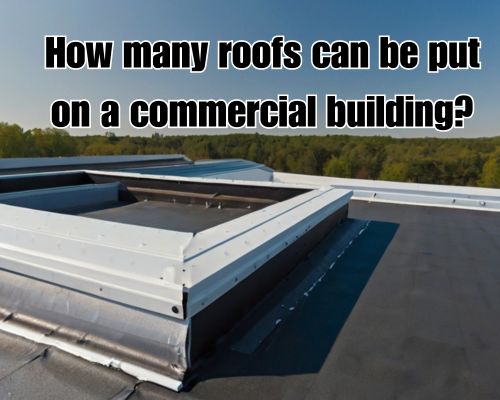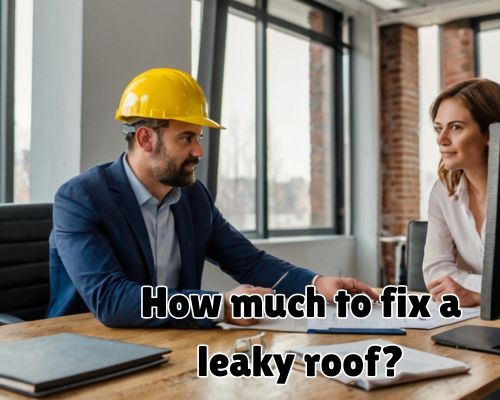When it comes to maintaining and renovating commercial properties in New Jersey, roofing is one of the most complex — and regulated — aspects. Property managers, investors, and building owners often ask a critical question: how many roofs can be put on a commercial building? It’s not just a matter of stacking layers for convenience or cost-efficiency — it involves code compliance, material integrity, structural load, energy performance, and long-term safety.

IWith CJ Commercial Roofing NJ, we’ll unpack everything you need to know about commercial roof layering, including what’s allowed under New Jersey building codes, common roofing materials used in the Garden State, when re-roofing is an option, and when full replacement becomes necessary. This guide includes expert insight from local roofing contractors and regulatory bodies across cities like Newark, Jersey City, Trenton, and Cherry Hill.
Understanding the Basic Rule: Two Roofs Max
Let’s cut straight to it: most commercial buildings in New Jersey are only allowed to have a maximum of two roofing layers. This is governed by the International Building Code (IBC) and adopted by the New Jersey Uniform Construction Code (UCC).
According to IBC Section 1511.3.1, commercial structures may not have more than two layers of roofing materials. This includes the original roof plus one additional recover or overlay. If the building already has two layers, a complete tear-off is required before installing a new system.
Why This Limit Exists
The limitation isn’t arbitrary — it’s rooted in building science. Too many layers can:
- Compromise structural integrity by adding excessive weight.
- Reduce thermal performance, leading to poor insulation.
- Trap moisture, increasing the risk of mold, mildew, and premature failure.
- Obstruct proper drainage, especially on flat and low-slope roofs common in New Jersey’s commercial architecture.
Types of Roofs Commonly Found on Commercial Buildings in New Jersey
New Jersey’s climate includes hot summers, icy winters, and frequent nor’easters — making roof selection vital. Commercial buildings here typically use:
- TPO (Thermoplastic Polyolefin): A popular energy-efficient, single-ply membrane system.
- EPDM (Ethylene Propylene Diene Monomer): A durable rubber roofing membrane ideal for flat roofs.
- Built-Up Roofing (BUR): Layers of asphalt and felt — the “classic” multi-ply roof.
- Modified Bitumen: Often installed over BUR systems for added durability.
- Metal Roofing: Increasingly used in modern office parks and industrial complexes.
These systems are often eligible for roof recovering, but only if the substrate is sound, dry, and free of blisters or buckling. Licensed New Jersey roofing contractors must inspect and document the condition before proceeding.
Recover vs. Replacement: Knowing the Difference
In the commercial roofing world, there are three primary options:
1. Roof Recover (Overlay)
A new membrane is applied over the existing one. This is permitted only if there’s just one roof layer and the current system is in reasonably good condition.
2. Roof Replacement
This involves stripping off all existing layers down to the decking and installing an entirely new roof system. It’s mandatory if:
- There are already two layers present.
- The existing roof is waterlogged, damaged, or structurally unsound.
- The building is undergoing a use change that demands new fire or insulation ratings.
3. Partial Re-roof
Common in New Jersey for buildings with multi-tenant occupancy, where only a section of the roof is replaced — this still must follow code requirements, and inspections are typically stricter due to piecemeal installation.
Local Code Considerations in New Jersey
While the IBC provides the national framework, municipal building departments across New Jersey — including Hudson County, Bergen County, and Middlesex County — can implement stricter regulations or add provisions, especially in coastal and high-wind areas.
Many townships like Atlantic City and Long Branch, located within hurricane-prone zones, may require:
- Wind uplift resistance testing.
- Enhanced fastening systems.
- Energy Code compliance, including R-value upgrades during re-roofing.
Before starting a project, a licensed commercial roofer in NJ must pull permits and undergo inspections by local building officials. Failure to comply can result in hefty fines, delays, or forced tear-offs.
The Hidden Costs of Too Many Layers
Even though recovering might seem like a budget-friendly shortcut, more layers often lead to costlier issues down the road. Here’s why over-layering is risky:
- Insurance claims may be denied due to code violations.
- Heat islands can develop, especially in urban areas like Newark or Paterson, causing HVAC systems to work harder.
- Infrared scanning or leak detection becomes less accurate with multiple layers.
- Structural damage can occur if the building isn’t designed to handle additional loads — a major concern in older buildings throughout Elizabeth and Camden.
Commercial Roofing Warranties and Manufacturer Limits
Another important factor: roofing manufacturers often void warranties when a second (or unauthorized) layer is added over an existing roof. In New Jersey, large-scale property managers working with national warranty programs (e.g., GAF, Firestone, Carlisle SynTec) must adhere strictly to these specs.
Additionally, many manufacturers require:
- Specific fastening patterns.
- Adhesion tests for overlay systems.
- Proof of deck integrity prior to approval.
Without this documentation, your 20–30 year commercial roofing warranty might not be valid.
How a New Jersey Roofing Contractor Can Help
Partnering with a certified, locally based contractor in New Jersey especially CJ Commercial Roofing NJ ensures you stay compliant. They’ll offer services such as:
- Roof core cuts to determine layer count and composition.
- Drone inspections and thermal imaging.
- Moisture surveys and slope evaluations.
- Guidance on tax incentives and energy rebates, especially through programs like New Jersey’s Clean Energy Program (NJCEP).
From Paramus to Toms River, New Jersey roofing professionals also understand climate-specific challenges and use materials rated for snow load, ice dams, and high UV exposure.
Final Thoughts: Know the Limit Before You Layer
So, how many roofs can be put on a commercial building in New Jersey? Legally, two layers maximum — and even that comes with caveats. In most cases, a full replacement is necessary once a building hits that second roof, especially in dense urban centers or hurricane-risk zones.
If you’re managing a commercial facility in New Jersey and weighing roofing options, consult with a state-licensed commercial roofer, review local codes, and factor in long-term performance, warranty coverage, and energy efficiency.
A safe, compliant, and optimized roof isn’t just about materials — it’s about following the rules, protecting your investment, and thinking long-term.
🔑 Key Takeaways
- New Jersey follows the IBC 1511.3.1 rule: maximum 2 roofing layers.
- Overlay is possible only if the first roof is dry and sound.
- Local building departments may have stricter requirements.
- Excess layering can void warranties and compromise structure.
- Always consult a licensed New Jersey commercial roofing contractor.

